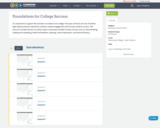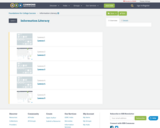
Word Count: 19669
(Note: This resource's metadata has been created automatically by reformatting and/or combining the information that the author initially provided as part of a bulk import process.)


Word Count: 19669
(Note: This resource's metadata has been created automatically by reformatting and/or combining the information that the author initially provided as part of a bulk import process.)

It is important to support the transition of students into college. First-year seminars are one of several high-impact practices reported to enhance student engagement and increase student success. This resource includes lessons on various topics commonly included in these courses such as critical thinking, reading and notetaking, health and wellness, advising, career exploration, and financial literacy.


As we dig into the conversation about academic success, research shows that information literacy is essential to the ongoing learning process and students' success.
![Heritages of Change: Curatorial Activism and First-Year Writing [Revised Edition]](https://img.oercommons.org/160x134/oercommons/media/upload/materials/images/Cover_RotelProject_FiSU_HeritageofChange-RE.jpg)
This textbook, Heritages of Change: Curatorial Activism and First-Year Writing, includes principles of writing and information literacy through the lenses of curatorial activism, cultural heritage, and curation/exhibition. Heritage topics that students are introduced to include (but are not limited to): anti-racism, #MeToo, indigenous peoples, women/gender/LGBTQIA+, climate change, etc. They gain a broader understanding of cultural heritage and heritages of change, particularly disability heritage, in general in order to apply the concepts through their writing. This textbook presents these topics, but more specifically how to communicate about and research them.
In first-year writing courses, it can often feel that we practice writing and research in a vacuum. Writing is about communication, and, if we do not feel that we have an audience, then it can seem like our writing has no purpose (even though practice of any kind will help us develop these skills). Heritages of Change: Curatorial Activism and First-Year Writing is a method for students to think about the social changes that were prevalent during the COVID years and remain important in their wake. Heritages of Change is a lens for thinking and writing about these ideas. Through curation and exhibition as an act of activism, students focus on a specific audience with whom they can communicate authentically about this dynamic world.
![Why Do I Have to Take This Course? [Revised Edition]](https://img.oercommons.org/160x134/oercommons/media/upload/materials/images/Cover_RotelProject-FiSU_TakethisCourse-RE.jpg)
Why Do I Have to Take This Course? A Guide to General Education helps students think about why they take General Education courses and what significance they have, individually and as a program as a whole. It allows students the time to contemplate connections, the potential reasons for developing certain learning outcomes and skills, and the applications to other courses as well as their professional and personal lives. General education is viewed through the lens of what John Lewis called "good, necessary trouble," expanding on how the liberal arts and sciences contribute to understanding and creating change in the world. Sections include stories, research, testimonies and reflections about student success, links to further readings, and activities.